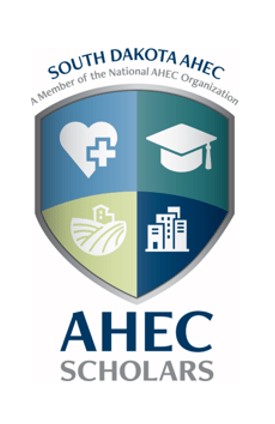SD AHEC Scholars

Apply Today!
Applications for our new cohort that will begin June 2025 are now open!
Students should fill out the application, linked below. All fields must be fully completed. Any application that is missing fields or attachments will not be considered for acceptance. Applications for the June 2025 cohort will be accepted through April 30 or until the cohort is full. Please click the button below to view and submit the AHEC Scholars Application - you will need to sign into your google account or create one. If you cannot do so, please reach out to Annette.Hill@BHSU.edu so that we can get you an alternate form of the application. Don't hesitate to reach out if you have questions on the program or the application process. Applications will be accepted until the cohort is full (15 students).
WR AHEC Scholars Application
AHEC Scholars
AHEC Scholars is HRSA-sponsored professional development program for health professions students interested in supplementing their education by gaining additional knowledge and experience in rural and/or underserved urban settings. This is a longitudinal program with interdisciplinary curricula to implement a defined set of clinical, didactic, and community-based activities. All experiential or clinical training is conducted in rural and/or underserved urban settings. While HRSA defines the overall core content areas and provides program guidelines, each AHEC center develops curriculum specific to the needs of their populations. The program is provided free for accepted students.
Program duration is 18 months, June through November of the following year, and includes the following requirements for a total of 160 hours:
- 80 hours didactic education
- 80 hours experiential/clinical training
- Rural Health Leadership Institutes (2), week-long experiences in both summers of the program, which count towards didactic and clinical hours. *Lodging during summer institutes can be provided for those Scholars who live out of town.
- Community Health Impact Project for a rural/underserved area of SD which counts towards clinical hours
- Celebrate achievements at the Graduation Gala
A condensed, 12-month program is available for health professions students in an associate degree or diploma program. These Scholars will participate in the week-long institutes during June of each year, then complete any remaining hours on their own schedule. This condensed schedule with an 80 hour requirement (40 didactic hours plus 40 clinical hours) is designed to better align with a shorter program of study, while prioritizing content that will provide the Scholar with a well-rounded experience.
What does the schedule look like for the standard 18-month program? Scholars join their cohort in-person for a week in June during both years of the program. During these week-long summer Institutes and the Community Impact Project, Scholars complete a large amount of their clinical and didactic hour requirements. Remaining clinical hours can be completed on the Scholar's own time, and WRAHEC can help facilitate opportunities for clinical shadowing and volunteering experiences. Remaining didactic education hours are completed through online learning modules or create-your-own didactic learning experiences, such as conferences, seminars, or webinars. The hours outside of the summer Institutes and Community Impact Project are completely self-paced during the 18 months of the program. We work to ensure the schedule is manageable for students who are already involved with classwork, clinical, jobs, and family.
Eligibility Requirements:
- Interested in the healthcare of rural and/or underserved populations in western SD
- Must be enrolled in at least a two year health professions program (undergraduate, graduate, or doctorate) at start of program with exceptions for the condensed 12-month program
- Preference given to students who are 1.5-2 years away from graduation at start of program; 1 year from graduation for the condensed, 12-month program
- Willing to immerse yourself in the didactic and experiential training of the 18-month program
 AHEC Scholars Program Core Topics--Educational and training activities will support the following eight (8) core topics:
AHEC Scholars Program Core Topics--Educational and training activities will support the following eight (8) core topics:
- Interprofessional Education (also known as interdisciplinary training) which supports a coordinated, patient-centered model of health care that involves an understanding of the contributions of multiple health care professionals.
- Behavioral Health Integration which promotes the development of integrated primary and behavioral health services to better address the needs of individuals with mental health and substances use conditions.
- Social Determinants of Health includes five key areas (determinants) of economic stability, education, social and community context, health and health care, and neighborhood and built environment, and their impact on health.
- Cultural Competency which seeks to improve individual health and build health communities by training health care providers to recognize and address the unique culture, language and health literacy of diverse consumers and communities.
- Practice Transformation which aims to fully support quality improvement and patient-centered care through goal-setting, leadership, practice facilitation, workflow changes, measuring outcomes, and adapting organizational tools and processes to support new team-based models of care delivery. AHEC programs are expected to develop and implement educational and training activities and build and strengthen strategic partnerships. Educational and training activities under practice transformation must target the specific skills and competencies needed to prepare students and practicing health professionals to effectively practice in a transforming health care system.
- Current and Emerging Health Issues such as Novel Corona Virus, Ebola and HPV Vaccinations will be discussed by the Scholars to keep their training relevant. They will gain a better understanding of new diseases, Zika for example, and crises such as the opioid epidemic, through updated research and intervention practices.
- Connected Communities and Supporting Health Professionals highlights the training and development of CHWs and paraprofessionals to be the connectors who serve as a liaison/link/intermediary between health professionals and the community to facilitate access to service and improve health equity, community/population health, and social determinants of health.
- Virtual Learning and Telehealth focuses on virtual learning, telehealth curricula, and community-based experiential training. Students will study how health care systems, hospitals, and clinics implement telehealth services, simulation-based technology, and virtual trainings to deliver patient care.
Meet Our Scholars!
"Nursing school was head knowledge; AHEC was heart knowledge. School introduced me to my work environment and individual patients; AHEC helped me understand my patients’ community and their culture. School introduced me to nursing students; AHEC introduced me to a larger health care team. Nursing school was a relentless battle; AHEC was a reprieve. School focused on what I needed to know; AHEC gave me an opportunity to learn what I want to know. School allowed me to achieve a degree and a license; AHEC helped me see the humanity of my patients and the needs of my community. School is what I “got through;” AHEC is something I am honored to have been a part of." - Sara Weber, AHEC Scholar and WDT nursing student
"With AHEC, local clinics, interprofessional practitioners, community organizations, outreach programs will be at your fingertips. As you grow in your education/career, the experiences and networking you will be doing through AHEC will only enhance your local visibility which will prepare you for frontline work as future health care providers. The communities out here are so vast, and some very much underserved; this is where AHEC Scholars will stand and serve to make a difference." - Debbie Theisinger, AHEC Scholar and SDSU nursing student
"AHEC Scholars has enhanced my education. I've been able to apply classroom concepts to real life ideas. I'm the nurse intern at DOC, PRN at Behavioral West, a tutor and a mentor - and I can still participate actively. Spending time with likeminded individuals, who are motivated to do better for our vulnerable populations, can create necessary change within our communities. I think this program is invaluable." - Chelsea Sheffield, AHEC Scholar & USD nursing student
Our scholars come from many of our professional healthcare programs in western South Dakota, including SDSU College of Nursing, Western Dakota Tech, SD Mines, BHSU, and others. Participating in AHEC Scholars gives students access to an exclusive network of healthcare professionals and educational opportunities focused in rural and underserved populations. The program is designed for future healthcare leaders in western South Dakota to:

- Build your resume and skill set to help you stand out in the job market while gaining the knowledge and experience to jump directly into the healthcare workforce upon graduation
- Grow your network as you learn from and work with healthcare professionals and leaders
- Immerse yourself into the communities and healthcare organizations of western SD to learn about the health needs of the area
- Learn how to be a culturally competent care giver, with training tailored specifically to the population of western SD
- Complete Poverty 101 training, Trauma Informed Care training, Lakota Lands & Identities traveling seminar, and Mental Health First Aid training
- Start the building blocks to a leadership role in healthcare
- And so much more!
Meet Our Partners!
While activities vary each year, WRAHEC is excited to partner with the following organizations for learning opportunities:- Center for American Indian Research and Native Studies (CAIRNS)
- Children's Home Society of South Dakota
- Community Health Center of the Black Hills
- Different Lens
- Fall River Health Services
- Good Samaritan Society
- Great Plains Tribal Leaders Health Board
- John T. Vucurevich Foundation
- LifeSource
- Monument Health
- NAMI South Dakota
- Project Recovery
- SDDOH, Office of Rural Health
- Sanford Underground Research Facility (SURF)
- West River Health Sciences Center
- Western Dakota Technical College Medical Simulation Center
- Working Against Violence, Inc.
- And many more regional healthcare and community organizations
